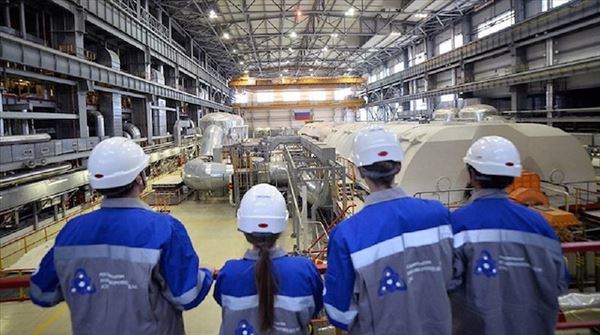Turkey ranks second with the number of its students enrolled in the leading Russian nuclear university, the National Research Nuclear University MEPhI
Turkey ranks second with the number of its students enrolled in the leading Russian nuclear university, the National Research Nuclear University MEPhI — Moscow Engineering Physics Institute, according to the deputy director of the university’s Nuclear Physics and Engineering Institute.
Turkey is second only to Vietnam with 192 students, including nuclear physicists who are currently studying at the university and 60 students who graduated in 2017 and 2018, Georgy Tikhomirov, deputy director of the Institute of Nuclear Physics and Engineering, told Anadolu Agency.
The number of students rose sharply when Russia and Turkey signed an agreement on construction of the Akkuyu nuclear plant in Turkey’s Black Sea region, said Tikhomirov.
This does not always happen, though, as some countries prefer to prepare nuclear specialists themselves, he said, referring to Iran, where Russia built several units of the Bushehr nuclear plant. But currently there are no future Iranian nuclear physicists studying in Russia, he explained.
The construction of Turkey’s first nuclear power plant, Akkuyu, is fully on schedule, according to Russian Deputy Foreign Minister Alexander Grushko. Upon completion, the plant will generate about 35 billion kilowatt-hours of electricity per year, with a service life of 60 years.
“Analysis shows while some of our graduate students work at nuclear plants, others work for the regulatory bodies,” Tikhomirov said, adding that as a rule they are talented and show great worth.
“They possess a unique competence, and besides their knowledge in nuclear physics engineering, they also speak Russian and can become a bridge between the two countries in general, and the scientific community in particular,” he stressed.
According to Tikhomirov, a task was set for exporting nuclear education to the Turkish Republic, so that it would be possible to prepare specialists for the nuclear industry, not only to work at the nuclear plants, but also in the regulatory bodies, institutes, and international organizations.
“For that we actively interact with Turkish educational institutions to build joint international programs.
“One of them is Istanbul University, which ranks high in international ratings, has nuclear reactors, but with no strong nuclear program,” Tikhomirov said, adding: “Our specialists may help to establish such a program. I believe we have great prospects of cooperation with laboratories of the universities in Istanbul, Ankara and other cities of Turkey”.
Apart from preparing students, MEPhI university has a pure scientific cooperation with a team led by Hilmi Volkan Demir — a professor at the National Nanotechnology Research Center of Bilkent University in Turkey’s capital Ankara — Igor Nabiev, head of Nano-Bioengineering Laboratory, told Anadolu Agency.
“In Turkey, we are collaborating with Hilmi Volkan Demir’s team. We have submitted a joint project in the frames of so-called strong coupling between light and metal. It’s a little bit different from nano-materials production, but it has very interesting physical effects.
“It is a really hot topic, it is applicable for a practical use, because it relates to more efficient conversion of CO2 while burning fuel. So if it works, as we hope — the theoretical calculations show it does — we may propose some kind of a new engine, which will help to reduce the level of CO2 in burning fuel,” Nabiev said.
